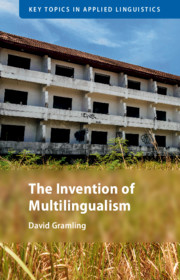Book contents
- The Invention of Multilingualism
- Key Topics In Applied Linguistics
- The Invention of Multilingualism
- Copyright page
- Dedication
- Contents
- Figures
- Preface
- Acknowledgments
- Introduction
- 1 Right-Sizing Multilingualism
- 2 The Problem of Value
- 3 Justice and Injustice
- 4 Hospicing Late Mono/lingualism
- Epilogue The Multilingual Undercommons
- Glossary
- References
- Index
2 - The Problem of Value
Published online by Cambridge University Press: 04 June 2021
- The Invention of Multilingualism
- Key Topics In Applied Linguistics
- The Invention of Multilingualism
- Copyright page
- Dedication
- Contents
- Figures
- Preface
- Acknowledgments
- Introduction
- 1 Right-Sizing Multilingualism
- 2 The Problem of Value
- 3 Justice and Injustice
- 4 Hospicing Late Mono/lingualism
- Epilogue The Multilingual Undercommons
- Glossary
- References
- Index
Summary
In Chapter 2, I argue that our ability to distill and evaluate what “multilingualism” is has been jarred, since the 1970s and even before, by profound transformations in political economy and its systems of value. An idealized economistic version of “multilingualism” has been engineered, for various mono- and multilingual subjects to embody or resist. I describe this production of an economistic model of “ordolingualism” as a mimesis of a mimesis, or what Michael Taussig has called a “mimetic excess” (1993, p. 252). Since the 1990s, this economistic dispositive of “ordolingualism” has functioned, with increasing allure, as an authoritative global infrastructure I call supralingualism, which is designed to suppress, manage, and alleviate the complex subjective and interactional experience of lived multilingualism.
- Type
- Chapter
- Information
- The Invention of Multilingualism , pp. 80 - 120Publisher: Cambridge University PressPrint publication year: 2021

